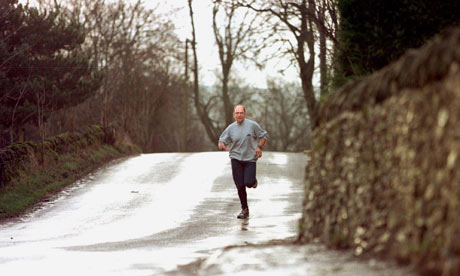
It is January, that time of the year when a bloated nation's thoughts turn to exercise. Some of us will go even further, and actually do some. Me included, sadly.
I say sadly because there is no surer sign that you are growing old than when you stop laughing at joggers and join their ranks. Although like Liam Gallagher, I prefer to call it running, not jogging. It's a small but crucial self-deception.
My personal motivation for getting off my fat, lardy arse was simple. After topping out in my mid-20s at a whopping 18 stone 7lb, a mixture of a) doing a bit of walking that went further than the fridge and didn't end up at Greggs and b) eating less (radical, I know), meant that, over a few years, I got down to 15 stone 5lb and stayed there for a frustrating couple of years.
Six months ago, I started running. This was meant to kick-start further weight loss without resorting to anything cranky like giving up beer. To an extent, it's worked. I'm down to, a still overweight, 14 stone 6 lbs and running a steady, if unspectacular, five miles (four or five times a week) in 41 minutes.
However, as I've graduated from an Alf Tupper: Tough of the Track approach to gait analysis, proper running shoes and breathable fabrics, one thing I haven't addressed is what I eat and drink, and how that might effect how I run.
Most of the runners I know are similarly ill-informed, although - talking to Louise Charlesworth, Senior Healthcare Adviser at the Wellness International centre, who work closely with Adidas - it seems that most of us, instinctively, have begun to eat in ways which make nutritional sense.
For instance, those runners who swear by a handful of jelly beans either before or during their run, are utilising the immediate glucose energy to good effect. It's not the ideal regime - we'll come to that - but it works.
Likewise, for all the complexity that surrounds eating and fitness, it turns out that an archetypal 'balanced' diet is sufficient for most recreational runners. According to the World Health Organisation, 'balanced' means you should derive 55% of your energy from carbohydrates, up to 15% from protein, and 30% from fats.
My daily diet, therefore - usually bran flakes or muesli; a sandwich or chickpea and chorizo soup for lunch; generally sensible things for tea - is not a million miles from what Charlesworth recommends:
Breakfast: cereal / muesli and wholemeal toast; fruit. Orange juice; tea with semi-skimmed milk.
Lunch: Wholemeal bread sandwich and salad; jacket potato and filling of your choice; chunky vegetable soup.
Dinner: pasta or rice dishes with a not too fatty sauce. Meat dishes with potatoes, vegetables, salads. Incorporate pulses, nuts and beans.
The idea is to maximise your levels of glycogen, a form of glucose produced when you eat carbohydrates which, unlike glucose itself, is stored in your muscles and liver.
Says Charlesworth: "The more glycogen you have, the longer and harder you can run. However, there is a finite amount of glycogen that the body can store, so in an endurance sport, like marathon running, the body also derives energy from the fat deposited just under the skin. This is why most experienced runners are thin. In order to economise on the precious glycogen stores, their bodies become more efficient at converting this mixture of energy. They use the fat and reserve the glycogen until they need it most."
It's not that I'm doing everything right, though. One major fail is the timing and frequency of when I eat. In terms of carbohydrate-to-glycogen conversion, and exploiting your reserves, the best time to run is two or three hours after a meal. In fact, I'm usually running five or six hours after lunch, and the later it gets the harder it becomes.
Similarly, the best time to refuel, in terms of making and storing glycogen, is immediately after, or certainly within two hours of running: "You may not feel like a full meal then, but a high carbohydrate drink or snack will do to start with. Bananas are an excellent easily digestible energy source."
"The most efficient eating pattern to maintain glycogen levels is 'little and often'," adds Charlesworth, but eating five light carb-based meals a day will be impossible for most of us: "The body works at a fixed-rate in converting glucose into glycogen and, so, will convert nearly all the CHO [carbs] from a small meal to glycogen. However, in one huge meal, the body, working at the same fixed-rate, will store as much glycogen as it can, and the rest as fat."
As for drink, well let's just say I often find myself grinding through a few miles on a Sunday morning, as a way of getting rid of a hangover. Unsurprisingly, most professionals advise against this, not least because alcohol jeopardises that most precious resource, sleep. Says Charlesworth:
"Sleep is essential, your muscles need rest and fatigue can slow runners down and even make them ill and susceptible to colds. If you train for distance running, it's been suggested you need at least an extra hour's sleep a night."
But what about you? Do you follow the eat-run three-hour window? Does it help? Or have you found yourself struggling to run on a full-ish stomach? Do you have other dietary tricks that work for you? Do you force yourself to eat straight after a run? Or do think sleep is the key factor which trumps the rest?

